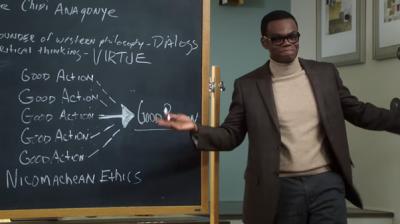Aristotle in The Good Place

“Who died and left Aristotle in charge of ethics?” So asks Eleanor in The Good Place (S01E03).
The response? “Plato!”
The Good Place (2016-2020) won critical acclaim for its comedy, originality, and surprising depth. The series explores what it means to be a good person, so it is perhaps only natural to find it has deeply Aristotelian roots.
One of the main characters, Chidi Anagonye (William Jackson Harper), is a philosophy professor – or was, until he died – and often refers to the ethical model of Aristotle.
In the third episode of Season 1, he is teaching fellow dead person Eleanor Shellstrop (Kristen Bell) how to be a good person. “Aristotle believes that your character is voluntary”, he explains, “because it’s just the result of your actions, which are under your control.”
In the third series, the protagonists realise that entrance into Heaven or Hell is being decided on a points-based system, whereby mortals are awarded points for virtuous actions and deducted points for negative ones. The system is definitively Platonic, built around the idea that virtue is fixed.
However, the complexity of modern life means that no decision can be made without unintended consequences, meaning that mortals could lose points for ostensibly virtuous actions – the result of this Platonic model is that nobody has been let into Heaven for 521 years.
In the final series, the protagonists successfully lobby to have the universe’s moral accounting system updated – now, humans entering the afterlife are subjected to experiments aimed at improving their moral compass until they are good enough to get into Heaven. That is to say, the new system is fundamentally Aristotelian – built on the principle that one can become a better person by practising doing good.


